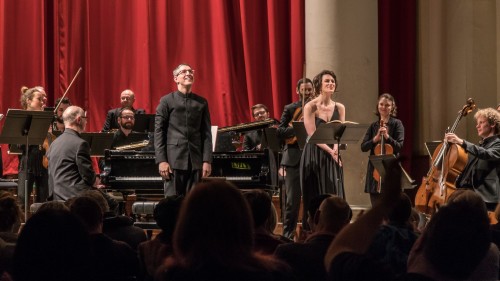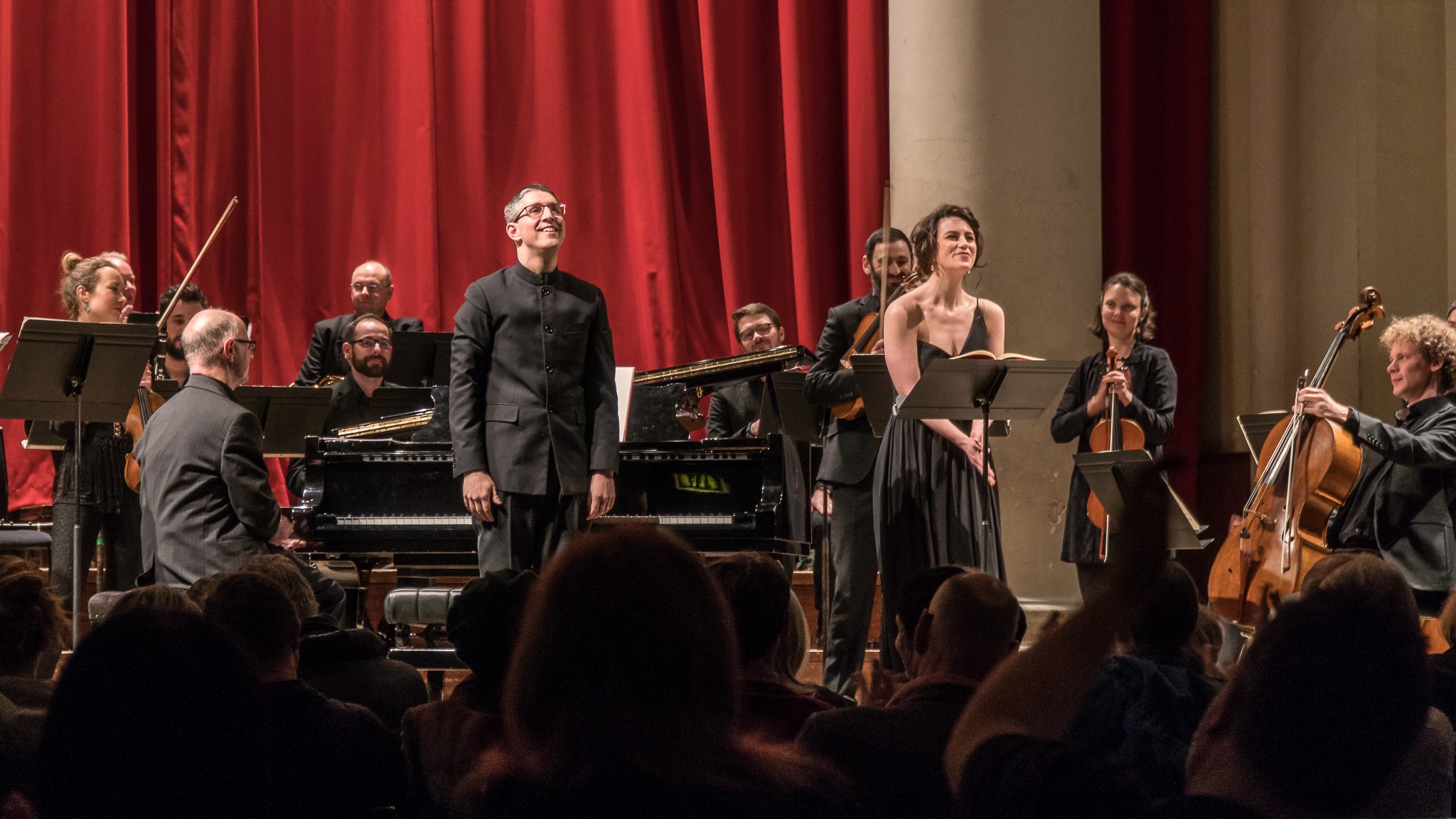 United Kingdom Various composers, Songs for Nancy: Jacquelyn Stucker and Rhiannon Llewellyn (sopranos), CHROMA / Andrew Griffiths (conductor and piano). St. John’s Smith Square, London, 7.3.2018. (JPr)
United Kingdom Various composers, Songs for Nancy: Jacquelyn Stucker and Rhiannon Llewellyn (sopranos), CHROMA / Andrew Griffiths (conductor and piano). St. John’s Smith Square, London, 7.3.2018. (JPr)

Salieri – Overture, La scuola de’ gelosi; Recitative and aria, ‘Or ei con Ernestina….Ah sia già de’ miei sospiri’ from La scuola de’ gelosi [Rhiannon Llewellyn]
Mozart – Recitative and aria, ‘Giunse al fin il momento…Deh vieni, non tardar’ (from Le nozze de Figaro) [Jacquelyn Stucker]; Concert aria, ‘Ch’io mi scordi di te?’, K505 [Jacquelyn Stucker]
Storace – Overture, and air, ‘With lowly suit’ (from No song, no supper) [Jacquelyn Stucker]
Sarti – Overture, Fra i due litiganti il terzo gode
Haydn – Cantata ‘Miseri noi, misera patria’ (Hob XXIVa:7) [Jacquelyn Stucker]; Symphony No.83 in G minor (‘The Hen’)
Martín y Soler – Cavatina ‘Dolce mi parve un di’ (from Una cosa rara) [Rhiannon Llewellyn]
Mozart, Salieri, Cornetti – Cantata for soprano and keyboard, ‘Per la ricuperata salute di Ofelia’ [Jacquelyn Stucker]
Bampton Classical Opera began in 1993 and was founded by its artistic directors, Gilly French and Jeremy Gray. They have established an enviable reputation for ‘breathing new life into little-known works of the classical period, in lively and accessible productions of exceptional musical standards, with some of the best of the country’s young singers’. After very successful UK premières of Salieri’s Falstaff (2003) and Trofonio’s Cave (for 2015 review click here), last summer they presented the first UK performances since the late eighteenth century of The School of Jealousy (La scuola de’ gelosi). This is a bitter comedy of marital feuding and its great success in Vienna almost certainly inspired Lorenzo Da Ponte and Mozart to create La scuola degli amanti – soon to be known by its more familiar title Così fan tutte – which has significant narrative parallels with the Salieri work. Singing in the first 1783 performances of The School of Jealousy were English soprano Nancy Storace (later one of Mozart’s favourite sopranos and the first Susanna) and bass-baritone Francesco Benucci (later Figaro and Guglielmo). It was one of the highlights of Storace’s career and 2017 marked the bicentenary of her death.
In Vienna of 1783 the Austrian Emperor, Joseph II, unhappy with a German opera company decided to form a new Italian one. Money of course was not a problem and he gathered the best of the best. As his librettist he chose Da Ponte and not long afterwards he met Mozart, the rest – as they say – is history. Mozart was already a celebrated musical figure but had never written an opera buffa and this was what the Emperor demanded. In very little time the ensuing collaboration between Da Ponte and Mozart resulted in Le nozze di Figaro, Don Giovanni and Così fan tutte. Of course the Emperor wanted the most exceptional singers, and he had brought from Teatro San Samuele in Venice, amongst others, Benucci and Anna Selina Storace, known as Nancy Storace.
Nancy Storace (1765-1817) was born in London — daughter of an Italian double-bass player, Stefano, who had married Elizabeth Trusler, an Englishwoman — and had started her singing career as a child prodigy at age 8 during a breakfast recital. She had voice lessons from the most celebrated singer-composers in the capital, Venanzio Rauzzini and Antonio Sacchini, soon thereafter making her operatic debut in a Rauzzini première. By 1778 accompanied by her parents she joined her elder brother, harpsichordist and composer Stephen, in Italy and subsequently she performed to great acclaim in the leading opera houses of the time.
Nancy was still only 17 when she arrived in Vienna in 1783 and was there until 1787 creating a number of operatic and concerts roles during her time there. Da Ponte apparently wrote: ‘She was at the peak of her career and mesmerised the whole of Vienna’. Susanna in Mozart’s Le nozze di Figaro was specifically written for her and possibly reflects the lively style of acting Nancy was known for. Mozart had first encountered her when Nancy made that significant debut in La scuola de’ gelosi and like the rest of Vienna was captivated by her. Nancy and Stephen – a respected composer in his own right — soon became close friends of Mozart.
As is frequently the case despite her public success Nancy’s personal life was fraught. At the height of her fame she was persuaded by her mother to marry the English violinist and composer John Fisher, 22 years her senior, who seems to have physically abused her to the point that the Emperor banished him from the city. After losing a child during pregnancy, she was singing in the first performance of her brother’s opera, Gli sposi malcontenti, in June 1785 when she collapsed and then retired from the stage for several months. Before she left Vienna for good there was a farewell concert on 23 February 1787 for which Mozart wrote the concert recitative and aria ‘Ch’io mi scordi di te’ K505. Nancy never saw Mozart again though he regularly corresponded with her though these letters have apparently been lost. Back in London she probably did not have the subsequent success she deserved, but still sang Italian works and more significantly collaborated closely with her brother – before his premature death in 1796 – on English operas and other theatre pieces. At some point she also met Joseph Haydn, who wrote the cantata ‘Miseri noi, misera patria’ for ‘the voice of my dear Storace’. After Stephen’s death she began a professional and personal relationship with the tenor John Braham and they subsequently has a son Spencer together. Nancy’s final public performance was on 30 May 1808 when she sang ‘With lowly suit’ from her brother’s No Song, No Supper. Nancy died as a result of two strokes on 24 August 1817 and is buried in an unmarked grave in the churchyard of St. Mary Lambeth.
Bampton Classical Opera deservedly further celebrated Nancy Storace – and their own 25th year – with a concert of music associated with her. Soprano Jacquelyn Stucker (who I had watched singing Frasquita in Carmen the previous evening) sang with eloquent phrasing and a secure, though flexible voice. Everything she sang had a flowing sound and was imbued with personal sentiment. This – and the soft glow of her mezzoish timbre – reminded me very much of a young Joyce DiDonato, a compatriot of hers. We heard Mozart’s very familiar recitative and aria from the final act of Figaro; Stephen’s ‘With lowly suit’ (sung at their retirement performance); the Haydn war cantata whose origin remains a little uncertain; and a Mozart, Salieri and Da Ponte cantata. The latter shows a remarkable collaboration between the two composers about whom much elsewhere has been written and this 1785 work was announced as: ‘For the happy recovery of favourite vituosa Mme. Storace the Court Theatre poet Herr Abbate da Ponte has produced an Italian song of joy.’ A final highlight was when Stucker joined forces with Andrew Griffiths at the piano, as well as, members of CHROMA for a poignant ‘Ch’io mi scordi di te?’, written by Mozart as that parting gift for Nancy, and evidence of the composer’s fondness.
Soprano Rhiannon Llewellyn radiantly sang the Countess’s final aria from La scuola de’ gelosi (a role in which she had big success at Bampton last year) and a brief cavatina from a Martín y Soler opera that Nancy had appeared in. Both singers were ably supported by Andrew Griffith at the piano or as conductor of a very accomplished chamber ensemble, CHROMA, who accompanied the singing idiomatically. There was sensitive solo woodwind, neat and fine-toned strings and a playful flute came to the fore during a light, stylish and airy account of Haydn’s 83rd Symphony (known as ‘The Hen’) full of the composer’s typical colours and textures, as well as, a ‘clucking’ major key second subject (the ‘hen’ element).
The concert was a joy from beginning to end and a tribute to all Bampton Classical Opera does and bodes well for their forthcoming ‘UK modern-times première’ of Nicolas Isouard’s Cinderella (for more information click here).
Jim Pritchard
